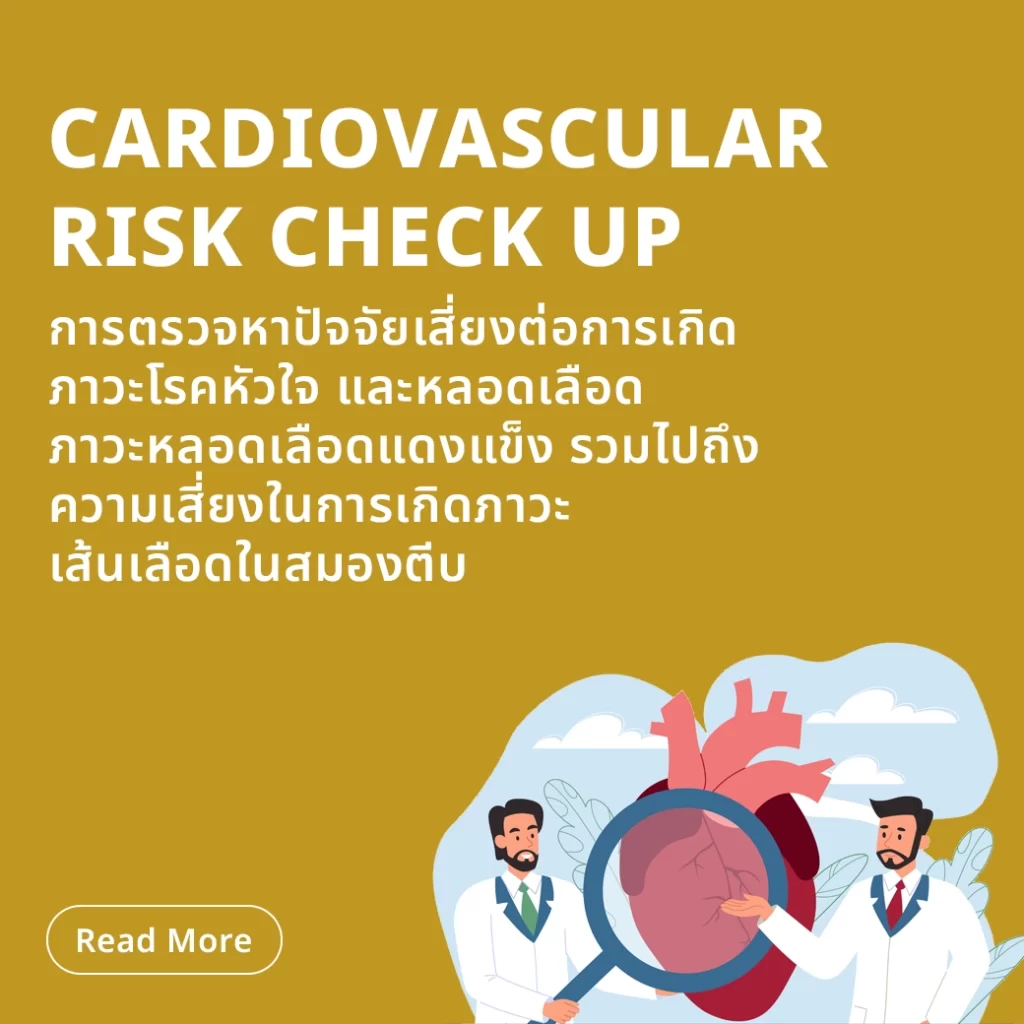Cardiovascular Risk Check Up
Unlock the Power of Advanced Blood Tests for Heart Health
Have you ever wondered why, despite undergoing routine annual blood tests—checking for diabetes, high blood pressure, cholesterol levels, and fatty liver—your results come back normal year after year, yet suddenly, you develop heart disease? The reality is, conventional hospital check-ups may not be enough!
With cutting-edge advancements in medical science, we now have a deeper understanding of cardiovascular risks. Unfortunately, this knowledge remains limited to a select few. Research in anti-aging and regenerative medicine has unveiled that we can now assess the likelihood of heart disease (heart attack) and stroke through innovative blood markers. These include Homocysteine, hs-CRP, Ferritin, Fibrinogen, Lipoprotein A, Oxidized LDL, and insulin resistance indicators.

Why Early Detection Matters?
Cardiovascular diseases are on the rise, with an increasing number of unexpected deaths—even among those who appear healthy and exercise regularly.
According to the World Health Organization (WHO), cardiovascular disease claims 7.2 million lives annually, accounting for 12.2% of all deaths worldwide. In Thailand alone, 37,000 people die from cardiovascular disease each year—an average of 2 deaths per hour. The mortality rate for acute myocardial infarction (heart attack) in Thailand is 4-6 times higher than in other countries.
Waiting for symptoms to appear may be too late. Early detection through specialized screening can significantly enhance longevity and quality of life.
“ผลลัพธ์ในภาพและวิดิโอเป็นประสบการณ์เฉพาะบุคคล… ผลลัพธ์การช่วยเรื่องสุขภาพของแต่ละคนอาจแตกต่างกัน”
Advanced Blood Tests for Hidden Cardiovascular Risks
These next-generation tests go beyond traditional cholesterol screenings to reveal deeper insights into your heart health:
1. Homocysteine – The Silent Artery Damager
Homocysteine is an amino acid naturally produced in the body. However, when its levels become too high, it turns into a toxic byproduct that increases the risk of heart disease and stroke. Studies show that elevated homocysteine levels contribute to atherosclerosis (artery hardening) by damaging blood vessel walls and promoting cholesterol buildup.
🔹 Why It’s Important: Measuring homocysteine levels helps assess heart and stroke risk in advance, allowing for early intervention and prevention.
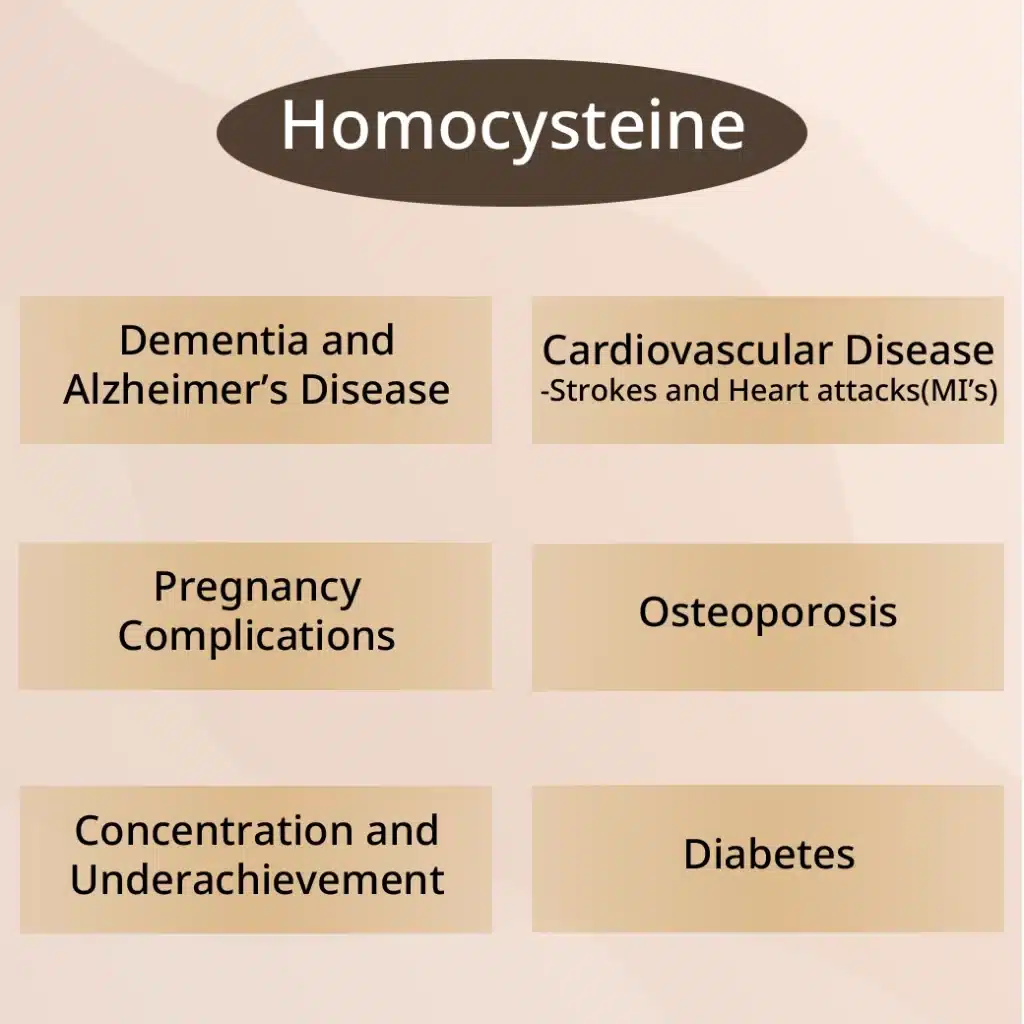
2. hs-CRP – Inflammation: The Hidden Threat
High-Sensitivity C-Reactive Protein (hs-CRP) is a key marker of inflammation in blood vessels. Elevated hs-CRP levels are strongly linked to coronary artery disease and heart attacks because inflammation accelerates plaque buildup and arterial hardening.
High levels of hs-CRP in the blood are associated with an increased risk of coronary artery disease or heart attacks (atherosclerosis) because inflammation leads to the accumulation of fat and hardening of blood vessels.
📌 The Lancet (2010) Study:
- Individuals with hs-CRP levels above 3 mg/L had a 58% higher risk of heart disease
- Those with elevated hs-CRP were 83% more likely to die from heart disease
- Harvard’s JUPITER Trial (2008) confirmed that lowering hs-CRP significantly reduces heart attack and stroke risk
🔹 Why It’s Important: Measuring hs-CRP helps in the early detection of artery inflammation and cardiovascular risk.
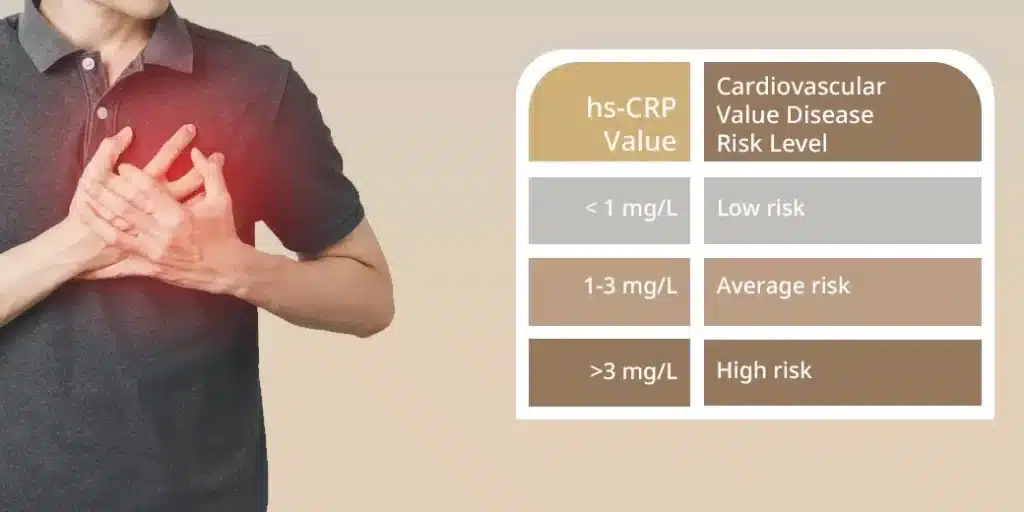
3. Ferritin – Iron Overload and Heart Damage
Ferritin is a protein that stores iron in the body. It serves as an indicator of the amount of iron stored in the body. When ferritin levels are too high, excess iron can generate free radicals, leading to oxidative stress and inflammation in the blood vessels, contributing to atherosclerosis (hardening of the arteries).
📌 University of California Study:
- Women with ferritin levels above 200 ng/mL and men above 300 ng/mL had twice the risk of coronary artery disease.
🔹 Why It’s Important: High ferritin levels may indicate excessive iron storage, increasing heart disease risk. Testing ferritin allows for early intervention and lifestyle modifications.
4. Fibrinogen – The Blood Clot Predictor
Fibrinogen is a protein essential for blood clot formation. High fibrinogen levels indicate an increased risk of abnormal clotting, leading to heart attacks and strokes.
📌 European Heart Journal Study:
- People with the highest 20% fibrinogen levels had a 2.7x higher risk of developing coronary artery disease.
🔹 Why It’s Important: A fibrinogen test helps predict blood clot risks, providing valuable information for stroke and heart disease prevention.
5. Lipoprotein (A) – The Hereditary Heart Risk:
Lipoprotein (A) is a protein similar to low-density lipoprotein (LDL) cholesterol, which plays a role in transporting cholesterol and fats to various tissues throughout the body. It that adheres to artery walls more aggressively than regular LDL, accelerating plaque buildup and narrowing of arteries.
📌 Genetic Link:
- Lipoprotein (A) levels are inherited.
- If a close family member has high Lipoprotein (A), screening is recommended to assess your risk early.
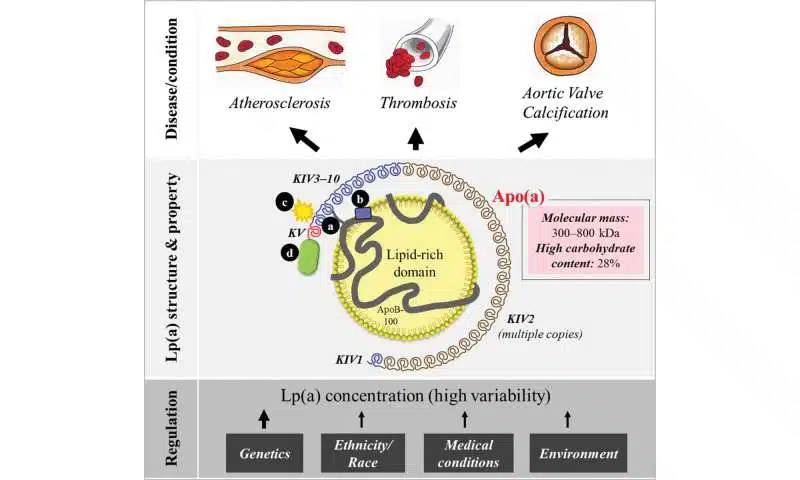
Thank you https://sciencex.com/wire-news
🔹 Why It’s Important: Checking Lipoprotein (A) helps individuals with a family history of heart disease take proactive measures for prevention.
6. Oxidized LDL – The Aggressive Cholesterol:
Oxidized LDL refers to LDL cholesterol that has reacted with free radicals in the body, causing a change in its structure. This altered cholesterol triggers inflammation and artery damage, speeding up atherosclerosis.
📌 Key Research:
- The Journal of the American College of Cardiology found that patients with heart disease had oxidized LDL levels 2-3 times higher than healthy individuals and these higher levels were significantly associated with the severity of coronary artery narrowing.
- University of Tokyo Study showed that reducing oxidized LDL levels in the blood could slow the progression of the disease and reduce the risk of recurrent acute myocardial infarction (heart attacks) by up to 40% (Tsimikas et al., 2020).
🔹 Why It’s Important: Testing oxidized LDL provides a more accurate assessment of heart disease risk beyond traditional cholesterol tests.
7. Insulin Resistance – The Root of Metabolic Syndrome
Insulin resistance occurs when the body fails to respond properly to insulin. When insulin resistance occurs, the body’s cells are unable to effectively use the sugar in the blood, causing an accumulation of sugar and fat in the bloodstream , leading to elevated blood sugar, high cholesterol, and high blood pressure—all major risk factors for heart disease and stroke.
📌 Harvard & The Lancet Studies:
- Individuals with insulin resistance are 2-3 times more likely to develop coronary artery disease.
Diet and exercise interventions can reduce heart disease risk by 50% (Diabetes Prevention Program Research Group, 2009).
🔹 Why It’s Important: Detecting insulin resistance early allows for preventive measures to avoid diabetes and cardiovascular complications.
Who Should Get a Heart Disease Check-up?
- People with diabetes,
- People with high blood pressure
- People with abnormal blood lipid levels
- Smokers consuming 10+ cigarettes per day
- Those with chronic stress or abdominal obesity
- Women post-menopause
- Women using birth control pills
- Individuals with a family history of heart disease
- Those who have a high- salt diet

Ref.กรมควบคุมโรค
Nowadays, there are many factors that contribute to the development of heart disease. In addition to internal body factors, environmental conditions such as PM 2.5 or even fluctuations in the weather can act as triggers, increasing the risk and severity of the disease.
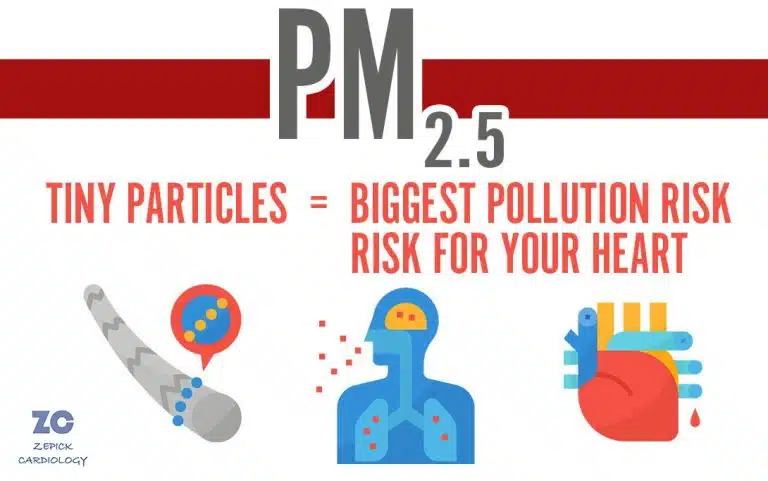
Preparing for the Test:
📍 Before Your Appointment:
- Avoid intense exercise 24 hours before
- Fast (no food or drink) for at least 10 hours
- Get 8-10 hours of quality sleep
📍 What to Expect:
Your test will be conducted at Mousai Wellness Center. A quick blood sample is collected (similar to a routine blood test), taking no more than 20 minutes after which, you can schedule a follow-up appointment with the doctor to review the results at your convenience.
Mousai Wellness Center – More Than Just a Blood Test!
At Mousai Wellness Center, with the expertise of the medical team and specialists, we don’t just detect disease—we empower you with solutions! Our expert team offers:
💡 Personalized lifestyle and nutrition coaching
💊 Targeted vitamin and supplement recommendations
💉 Intravenous vitamin therapy for optimal wellness
🧬 Cutting-edge stem cell therapy for rejuvenation
Empower yourself today. Protect your heart. ❤️


ศึกษารายละเอียดเพิ่มเติมที่
References:
Serban Maierean, Richard Webb, Maciej Banach, Mohsen Mazidi, The role of inflammation and the possibilities of inflammation reduction to prevent cardiovascular events, European Heart Journal Open, Volume 2, Issue 4, July 2022, oeac039, https://doi.org/10.1093/ehjopen/oeac039
Citation: Adapted from “Facts About High Homocysteine in Blood” by Dr. Mallesh Cardiac, drmalleshcardiac.com, January 2022.
You, S.-A., & Wang, Q. (2005). Ferritin in atherosclerosis. Clinica Chimica Acta, 357(1), 1–16. doi:10.1016/j.cccn.2005.02.001
Shao, C., Wang, J., Tian, J., Tang, Yd. (2020). Coronary Artery Disease: From Mechanism to Clinical Practice. In: Wang, M. (eds) Coronary Artery Disease: Therapeutics and Drug Discovery. Advances in Experimental Medicine and Biology, vol 1177. Springer, Singapore. https://doi.org/10.1007/978-981-15-2517-9_1
Citation: Adapted from “High Sensitivity C-Reactive Protein (hs-CRP)” by Thyrocare at Second Medic, www.secondmedic.com/lab/thyrocare/high-sensitivity-c-reactive-protein-hs-crp.
Reyes-Soffer G, Ginsberg HN, Berglund L, Duell PB, Heffron SP, Kamstrup PR, Lloyd-Jones DM, Marcovina SM, Yeang C, Koschinsky ML; American Heart Association Council on Arteriosclerosis, Thrombosis and Vascular Biology; Council on Cardiovascular Radiology and Intervention; and Council on Peripheral Vascular Disease. Lipoprotein(a): A Genetically Determined, Causal, and Prevalent Risk Factor for Atherosclerotic Cardiovascular Disease: A Scientific Statement From the American Heart Association. Arterioscler Thromb Vasc Biol. 2022 Jan;42(1):e48-e60. doi: 10.1161/ATV.0000000000000147. Epub 2021 Oct 14. PMID: 34647487; PMCID: PMC9989949.
Pinyapat Chaipurihiran (Dr.Big), M.D; Preventive Medicine in Public Health, ABAARM, IBLM
Mousai Wellness Center
The professional Anti-aging Center, you can trust.
#HeartHealth #BloodTests #StrokePrevention #CardiovascularHealth #KnowYourNumbers #PreventionIsKey#HeartGuard Package#Protect, Prevent, Prevail #ตรวจก่อนรู้ก่อน ป้องกันได้#mousai#mousaiwellness#anti-aging#reverseaging#holistic#wellness

